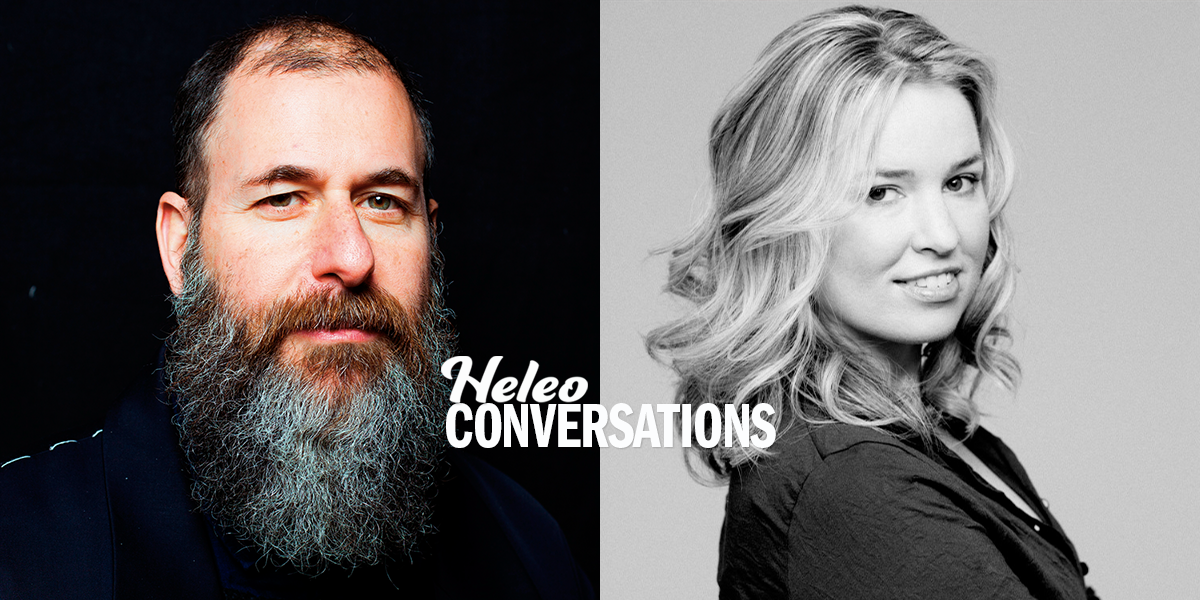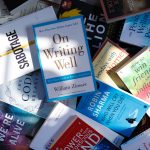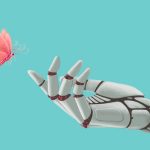What, if anything, do we lose by interacting with the digitized world? Is the internet fundamentally surrealist? Virginia Heffernan is a writer and cultural critic whose most recent book, Magic and Loss: The Internet as Art, explores these deeply human aspects of digital culture. Recently, she joined Kenneth Goldsmith, award-winning conceptual poet and author of Wasting Time on the Internet, to discuss the cultural changes wrought by the introduction of digital. Their conversation was originally streamed on Facebook Live.
Virginia: Both of us see wasting time on the internet as not a bad thing.
Kenneth: It’s remarkable. I feel like we’ve almost written the same book.
Virginia: We both were enchanted by some of the same conceits, including “lossiness.” Tell us something about “lossiness” because that fascinates me, too. A term of art from sound engineering.
Kenneth: That’s the compression algorithm for the MP3. It turns it into a Venetian blind so that very little information is necessary for you to decode or re-encode music to make it full again. Now everybody is going back to vinyl. And I love Neil Young, but I don’t like the Pono.
Virginia: Explain what Pono is.
Kenneth: Pono was like a full audio fidelity MP3. It comes in a weird triangular thing that almost looks like a portable speaker. Neil was upset because we lose 95% of the sound to MP3s so he was restoring the sound. But they did a study and had people do blind tests: listen to MP3s and listen to Pono. Most people preferred the MP3 to the Pono.
Virginia: Wow.
Kenneth: The reason why, I believe, was because they actually liked the sound of the lossy MP3. That’s a nostalgic sound. That’s the sound of their moment, the same way that a crackling vinyl album would be mine, or cassette tapes. There’s something in those cassette tapes that actually, when you play it, you hear a sort of ghost of the other side.
Virginia: Is that factually true? That it comes with the tape?
Kenneth: Yes, it is. I’m sure you’ve heard it. Older tapes—you hear the other side at the same time.
Virginia: I love that you said that MP3s are like Venetian blinds, because we struggle to find the language to describe what’s missing from MP3 compression. When people say vinyl is warmer, often they say that they are in the music more deeply, which I think is their imagining the groove. They’re literally imagining, “I’m in that thing.”
But people don’t really care, they can’t tell the difference. Laypeople also can’t tell the difference between red and white wine in blind taste tests. The idea that you can’t tell the difference when you’re not aware of the source, that you’re moving into the aesthetic experience as people do with vinyl, it doesn’t mean that the MP3 sound doesn’t inspire a sense that, “I’ve lost something. I’m grieving for something.” In 2001, when the iPod was released, people said, “We’re doing something wrong. We’re missing the album. We’re missing the cover art.” Just trying to put their finger on what we’re missing. I attribute that impulse to why we say we’re missing something from the actual music.
Kenneth: I attribute it to nostalgia and people fearing erosion and, actually, morality. Mostly with people my age. Vinyl was better when we were kids, you know?
“There’s this false empiricism about what we’ve lost or what was better when we were younger.”
Virginia: That’s right.
Trending: 5 Reasons Life Gets Better After Your 40s
Kenneth: It reminds me of my father, who would wag his finger at us kids in the ’60s, sitting in front of the television, and say, “You’re rotting your mind in front of that thing. When I was your age we had radio and we had to imagine everything. You kids have it all there for you in front of you.” You know what? It worked out okay.
Virginia: Yes. I’ve talked a lot about whether digital technology is a curb on the imagination. There’s this false empiricism about what we’ve lost or what was better when we were younger. Clearly the radio is a perfect example, because who’s to say who is imagining more or less?
I have a friend who started watching TV back when, on the higher channels, they would have pornography. He got really into scrambled porn because his parents didn’t pay for the high channels. Now it’s erotic to him to see anything scrambled—because you’re not supposed to see it, because you had to supply so much. You had to go more than halfway to meet it. You talk about this a lot in your book. Especially in recognized art, cubism and expressionism.
Kenneth: Yeah, the missing pieces are the hallmark of modernism, or a certain strain of modernism. Modernism put things together in the wrong way and left it for you to decode.
It made some work for you to do and that is the difference, what McLuhan said, between cold and hot media. Cold media, you’ve got to do the work to put it together. Television is cold because you’ve got to reassemble those Ben-Day dots into a cohesive image.
Virginia: That’s right.
Kenneth: Hollywood is hot because, man, it’s all there for you. I’m not against hot media. Loss is a funny word. I’m of the opinion that we’re not really losing anything. I believe that digital media is additive. (I believe there’s emotional loss—I think that you recognize.)
For example, there are more books now than there were before. We have not lost books. Not only that, they’re more beautiful because it’s not a pile of pixels. 20 years ago, books looked bad, particularly books of experimental poetry, because nobody had any money. I’ve just published a book with Verso, a leftist press, and Verso’s books almost look like coffee table books now. They’re beautiful. The web has created the beautiful object.
“It’s what the web can’t do that becomes interesting.”
Virginia: I absolutely agree with this. I don’t know if you’ve heard this story, but pop-up books are impossible to make but by hand. Even Pat the Bunny and mass-produced ones have to be hand-sewn in China. Acuity, the insurance agency, decided to create a pop-up book for its annual report around four years ago. Suddenly, everyone wanted to get their hands on Acuity’s annual report. It was a really great pop-up, with tons of cutouts. Who cares about getting a digital annual report? If that’s not a response to digital culture, then I don’t know what is. I think foodism is also an epiphenomenon of the web.
Kenneth: It’s what the web can’t do that becomes interesting. The locavore food—the web still can’t cook a good locavore meal.
Virginia: Exactly. Now it has to be local and you have to know the source. It is hard to surmount a cup of coffee that can cost you $4. To do that, there has to be a lot of language around it and a lot of commodity fetishism that can’t be digitized.
Kenneth: Stumptown can’t be digitized.
Virginia: Not so far.
Kenneth: That is why painting continues to live and be important, because the web still can’t make a good painting.
One thing I loved about your book was where you talk about the fear of the screen and how it’s not just now that we’re fearful of screens. You use a beautiful example of the father at the breakfast table reading the newspaper, who has the screen around him, or the woman who’s sitting on the couch reading the novel, engaged in her screen.
“How did we get convinced that being informed—not entertained—was what you did as a responsible citizen?”
Virginia: There’s a great passage in Sister Carrie where, if you lost your job, to keep face, you would dress in a suit and pretend you were still going to work and sit in a hotel lobby, like at the Waldorf, reading the newspaper. That was the wasting time thing that you pretended to do instead of working. Like all of us going to check in Facebook during the day.
I was actually thinking this morning, what is it to be informed, and how did we get convinced that being informed—not entertained—was what you did as a responsible citizen?
Kenneth: I’ll tell you when: after 9/11. It was the best thing that ever happened for news. We began checking constantly. The double-header of 9/11 and anthrax got us hooked. I never compulsively looked at news before 9/11, but it became a habit.
Virginia: You got caught on 9/11 with the news. It sounds like you were immune to O.J.
Kenneth: O.J. was big for you.
Virginia: I still wish the O.J. trial was going on. When it ended and people kept saying, “That lasted forever,” I was just like, “I could deal with another year of it.” Like, “Can’t we hang this jury and start again?”
Trending: 5 Simple Strategies for Persuading Anybody
I like forensics; I couldn’t figure Tora Bora and the attack plan. I also didn’t know if we should retaliate or take a police action. I tried to read everything and I just came away with a big question mark. That was my problem with the news, but we just cracked, maybe, JonBenet Ramsey, and how long have I spent in internet binges reading over that ransom letter, hostage letter, and trying to parse the handwriting? That is how I spend time on the internet sometimes, just trying to crack codes that I think I have some hold on.
Kenneth: It’s so interesting. That wasn’t possible with television. Can we just tell people my age, the web is not TV?
Virginia: We need an elegy. When analog TV ended and it became digital, I call it the analog sunset, because they were profoundly worried, cable companies and Verizon and so forth, that old people would still have two televisions and in the sunset of their lives would suddenly be deprived of television.
Kenneth: I love when stations used to sign off the air. They’d show the flag waving and they played the national anthem.
Virginia: That’s right.
Kenneth: Then it would just go to fuzz.
Virginia: “America, it’s bedtime.”
“The thing to do is to announce a death on Twitter. If you’re the first one that gets that, boy, do you get capital.”
Kenneth: It was marvelous. One thing I noticed, and I’m curious of your reaction to this: the thing to do is to announce a death on Twitter. If you’re the first one that gets that, boy, do you get capital.
Virginia: That’s right. But if you’re second, it sucks. It’s really hard to be the first unless you’re sitting in a cop car next to the person.
Kenneth: Absolutely. Then you’re credited. You’ve become that primary source. This was something I wanted to discuss with you, about temporality. We roll our eyes when somebody tweets out something from last week. Like, “Oh my God, that is so old.” On the other hand, artifacts are continually recycled. For example, the whole phenomena on Facebook of obituaries and deaths.
Virginia: Yeah. On Father’s Day, everyone’s father who has passed on is discussed. I love it. Do you? Facebook is such a great retirement community that all of us who stayed with it went, “Thank God, the spirited young people went elsewhere.” There’s a certain elegiac voice on there. People chronicling their suffering.
Kenneth: To me the whole thing is Warholian. Between Warhol and Borges, they predicted the entire internet. I read those repetitions and cycles and moments, big broad moments of stasis and ambiance through Warhol’s lens. Warhol’s films in particular—the paintings lead to the films, which are now recognized as being this primary contribution to culture.
Every time people complain I go, “But Warhol predicted this 50 years ago. Why are you shocked?” It’s all there. I just keep finding precedents. I have the sense that modernism was a staging ground for the digital. Modernism was rather useless in its moment. It was militaristic and patriarchal, and one -ism toppled another -ism, but it was like planes taking off. The abstract expressionist plane crashes, to be succeeded by the pop plane, which takes off and crashes, which is succeeded by the minimalist plane, which takes off and crashes—throughout the 20th century. What if we imagine that those planes had actually found flight into the 21st century instead of having crashed, and can actually inform us of what it means to be digital now?
Virginia: You find, and I don’t know how you did it, these self-digitized figures who are digital before digital in the art world. Remind me of some of those figures.
Kenneth: My favorite is Joseph Cornell. Look at a Cornell box. It is about the size of a laptop or a tablet now. It’s got geometry and architecture that is remarkably similar to our docks and icons. Also, the way that he puts a box together is a mixture of logic and nonsense, which throws us into the dream state, which we’re in now. Breton would be delighted to see everybody walking around here and not here, in a collective dream unconscious, on the streets, looking at their phones. It’s marvelous. It’s surrealism. I believe that surrealism is truly the DNA of the internet.
If we can understand the disjunction of surrealism and how it doesn’t make sense, the rupture of surrealism, then I think we can begin to make peace with our contemporary condition. People like Andrew Sullivan keep coming back again because they’re trying to make sense of it. They’re trying to put a monolithic face on it, but it’s many contradictory things. They never offer solutions. They only offer complaints. I think we need to become comfortable with disjunction. That’s a hard one for Americans.
Virginia: It is a hard one. You and I have a slightly similar academic path. Discontinuities and disjunction and the non-correspondence of language to reality are ideas that on some level I feel very happy with. It’s almost worse to mention Derrida than it is to say you like the internet.
Trending: 40 Nonfiction Books to Look Out for in 2024
Kenneth: Among whom? I was thrilled to see that we both mentioned Derrida in our book. Who’s upset with Derrida? My friends love Derrida.
Virginia: Yeah. Maybe journalists.
Kenneth: Oh. Well, of course.
Virginia: Because the Andrew Sullivan essay, it’s a function of the style of that particular kind of essay in New York magazine that you have to nail a point and say over and over, “Here’s what’s wrong with this thing now.” It’s not just, “I feel uneasy because I liked web 1.0 and blogging better than web wherever we are now; or, I don’t understand Snapchat, so I’m going to say I’m uneasy with the non-plasticity of my brain now.” Instead, you get, “Here’s five studies from neuroscience to say this is a disaster. Here’s how this is the beginning of tyranny.” Very objective, empirical claims that belong to journalism.
Kenneth: He read Barthes, but never understood how to apply it to his day-in and day-out life. This is the thing I also want to say about you. I’m disturbed when people describe you as a journalist because you’re not. I believe your work is academic. It’s scholarly. I think you’re a public intellectual and a very, very good one.
“Deepak Chopra is the new Derrida.”
Virginia: Gosh.
Kenneth: Why write a book now? You know, in the digital age we’re both writing how much we love the internet—why write a book? Of course, I followed your journalism. I read it religiously, but you never could go to where you went in that book in a journalistic format. It would be wrong. Derrida would be wrong. They wouldn’t sell papers. I find that your book allows you to go to the depths of where you really need to go with your thinking.
Virginia: I hope so. I don’t know if the audience can see, but I like that there’s sort of a suit. You’re sort of in a suit and you’re sort of a convincing talking head, but then there’s this amazing—I hate to say deconstruction, but commentary—
Kenneth: Go. It’s okay. Let’s embrace deconstruction.
Virginia: I’m writing for Fast Company now. Tech people are trippy, weird. They will do anything. Derrida does nothing to people who listen a lot to Deepak Chopra and have really far-out ideas.
Kenneth: Deepak Chopra is the new Derrida.
Virginia: Their names are practically anagrams.
Kenneth: I asked you this question about why write a book. I think when somebody asks another person a question in a public forum, they’re really addressing themselves and their own anxiety. My feeling about why write a book in paper now is that what a book does is it actually stops the flow of information.
Virginia: I love that.
Kenneth: It takes it outside of it. You actually have to make a stance and a stake, and it can be examined from all sides. A blog, once it goes past the fold, for all intents and purposes, vanishes.
This conversation has been edited and condensed.




























